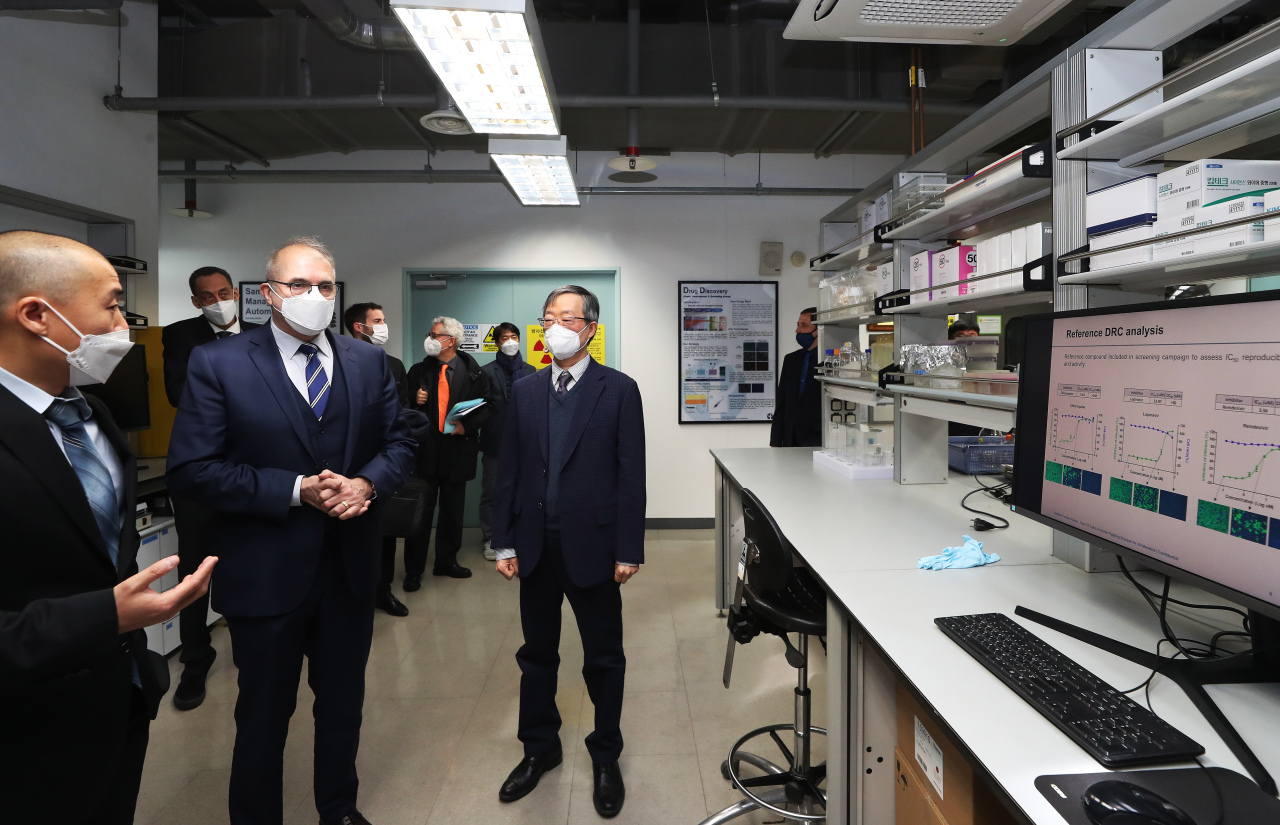 |
French Ambassador to Korea Philippe Lefort (second from left) observes the COVID-19 therapy research facility at Institut Pasteur Korea in Pangyo, Gyeonggi Province, Thursday. Joining him is IPK’s Chief Scientific Officer Spencer Shorte (second from left) and IPK CEO Ryu Wang-shick (right). (Yonhap) |
It is great to have a positive attitude in scientific endeavors, but to trumpet unrealistic projections rings alarm bells. And the latest attempt to develop vaccines for COVID-19 may be the case, according to Ryu Wang-shick, CEO of Institut Pasteur Korea, on Thursday.
“Most vaccine developments fail. We are hearing positive news regarding the COVID-19 vaccine development efforts -- but that’s hope, not reality,” Ryu said.
IPK had invited French Ambassador to Korea Philippe Lefort and Deputy Minister Yong Hong-taek at the Office of R&D Policy of the Ministry of Science and ICT to its headquarters in Pangyo, Gyeonggi Province, to underline its ongoing research to pinpoint a COVID-19 therapy, while celebrating 15 years of formal French-Korean scientific ties.
Vaccine development normally takes 18 months and has less than a 7 percent success rate, Ryu said.
“Drug repurposing is the only available and feasible option,” Ryu offered.
IPK has found 24 existing drugs that showed potential effectiveness in fighting the SARS-CoV-2 virus that causes COVID-19. Among the candidates, it is currently researching two -- ciclesonide and niclosamide.
Ciclesonide is a component of asthma medication sold in Korean pharmacies under the trade name Alvesco. On April 4, IPK started domestic clinical trials of ciclesonide’s efficacy for COVID-19.
Niclosamide is an anti-parasite drug believed to be 40 times stronger than Gilead Science’s much-touted COVID-19 treatment candidate remdesivir. Its power has been proven in laboratory conditions, but the human body cannot absorb the drug, originally intended for animals, in the current tablet form. Global pharmaceutical companies are scrambling to find a suitable way to administer it.
IPK is collaborating with Daewoong Pharmaceutical for animal studies of niclosamide for a proposed clinical trial application in July, but that timeline may be indefinitely postponed due to difficulty in securing the necessary laboratory animals from China, Ryu said.
The decreasing number of COVID-19 patients in Korea is also leading to fewer people showing up for clinical testing, ironically slowing the research for a therapy, said Kim Seung-taek, lead scientist of IPK’s COVID-19 treatment research.
But such shortfalls may prompt changes in traditional clinical trial steps, said Spencer Shorte, the chief scientific officer of IPK.
Before, for a medicine to launch in a new country, regardless of the drug’s successful clinical trial results elsewhere, it had to be tested afresh in the new location. Given the ongoing situation, however, a change may just be possible under the World Health Organization’s drive for global clinical trials that follow the same protocol to work conjunctionally.
“To fight global pandemic, we have to put collaboration above everything else,” Shorte said.
While no specific timeline is known for repurposed drugs to hit the market as COVID-19 treatments, the discoveries made by IPK have been a leading example of Korea’s scientific fight against the pandemic.
By Lim Jeong-yeo (
kaylalim@heraldcorp.com)








